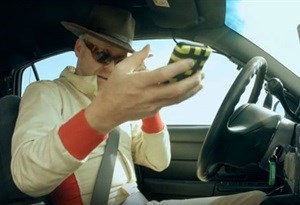
"We have long considered hands-free devices to be better, safer and easier because they allow you to have both hands on the wheel," says Warwick Scott-Rodger, Head of Dialdirect, "This experiment, places some big question marks behind this well-known 'fact'."
The experiment, which pitted a "hands-free" approach against a "hands-full" approach, was conducted with the help of a state-of-the-art driving simulator at Stanford University Automotive Innovation Facility. The aim was to collect scientifically accurate data in a controlled, but realistic environment.
Motorists had a relatively simple task: they needed to pay attention to GPS instructions and avoid crashing into any other vehicles or pedestrians.
During the experiment, 15 drivers were tested using a cellphone and 15 other drivers were tested using a hands-free device. Out of the 15 "hands-full" drivers, only one passed, five failed by driving the wrong way and nine crashed. Of the 15 "hands-free" drivers, one passed, six failed by driving the wrong way and eight crashed.
This means that, statistically, there is no difference in the potential danger of these two approaches.
"Some will say that the one group of drivers was simply better at multitasking than the other," says Scott-Rodger. "We can also argue at length about the obvious benefits of having both hands on the wheel. Fundamentally, both hand-held and hands-free devices split your attention between having a conversation and driving and endanger the lives of both you and other motorists."
Dialdirect offers the following tips on phone safety while on the road:
"At Dialdirect we understand that people tend to resort to risky behaviour, like using your cellphone while driving, is because we have a lot to do and not a lot of time to do it in", concludes Scott-Rodger. "However, using a cellphone while driving is considered six times more dangerous than driving while under the influence of alcohol. Now that's a sobering thought, isn't it?"